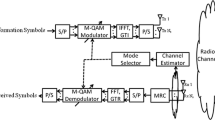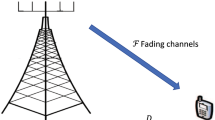Abstract
Increasing demand for wireless personal communications has stimulated research on new digital radio technologies that are optimized for various service applications and environments. This paper discusses the performance of a slow-frequency-hopped time-division multiple-access (SFH-TDMA) technique, which has been proposed as a “high-tier” extension of a low-complexity TDMA architecture optimized for low-power pedestrian applications. The SFH-TDMA technique considered uses QPSK modulation and rate-1/2 convolutional coding. Numerical results for a wide range of fading rates are obtained through analytical calculation of the effective signal-to-noise ratio combined with a simulation approach which incorporates measured multipath channels and actual frequency correlation among contiguous hopping channels. The results indicate that the SFH-TDMA technique can tolerate root-mean-square (rms) delay spread up to several bit periods without a need for adaptive equalization, but also point to the need for fast power control when the fading is slow and the rms delay spread is much smaller than the bit period. This work is targeted toward understanding the implications to local exchange networks of wireless technology alternatives that could provide access to those networks.
Similar content being viewed by others
References
G. R. Cooper and R. W. Nettleton, A spread-spectrum technique for high-capacity mobile communications,IEEE Transactions on Vehicular Technology, Vol. VT-27, pp. 264–275, 1978.
D. Verhulst, M. Mouly, and J. Szpirglas, Slow frequency hopping multiple access for digital cellular radiotelephone,IEEE Journal on Selected Areas in Communications, Vol. SAC-2, pp. 563–574, 1984.
CTIA Wideband/Spread Spectrum Open Forum. Chicago, IL, Mar.–May 1992.
N. Livneh, R. Meidan, M. Ritz, and G. Silbershatz, Frequency hopping CDMA for future cellular radio,Conference Record IEEE VTC'92, Denver, CO, pp. 400–404, 1992.
B. Gudmundson, J. Skold, and J. K. Ugland, A comparison of CDMA and TDMA systems,Conference Record IEEE VTC'92, Denver, CO, pp 732–735. 1992.
D. C. Cox, W. S. Gifford, and H. Sherry, Low-power digital radio as a ubiquitous subscriber loop,IEEE Communications Magazine, Vol. 29, pp. 92–95, 1991.
K. Rohani, A. Ghosh, and P. Yip, Low cost high performance CDMA system for U.S. PCS,Conference Record IEEE ICUPC'92, Dallas, TX, pp. 278–282, 1992.
The Motorola PPS-1800 high-tier wireless personal communication system, Contribution TR45.JEM/92.11.09.242-T1P1/92242,Joint Experts Meeting on PCS Air Interface (JEM), Reston, VA, 1992.
Radio interface and system considerations for FPLMTS high tier TDMA system. Contribution 8-1/276, CCIR TG8/1, Montpellier, France, 1993.
P. D. Rasky, G. M. Chiasson, and D. E. Borth, An experimental slow frequency hopped personal communication system for the proposed US 1850-1990 MHz band,Conference Record IEEE ICUPC'93, Ottawa, Canada, Paper 44.02, 1993.
D. C. Cox, A radio system proposal for widespread low power tetherless communications,IEEE Transactions on Communications, Vol. 39, pp. 324–335, 1991.
Bellcore Technical Advisories, Generic framework criteria for universal digital personal communications systems (PCS), FA-NWT-001013, Issue 2, Dec. 1990.
M. Mizuno, Randomization effects of errors by means of frequency-hopping techniques in a fading channel,IEEE Transactions on Communications, Vol. COM-30, pp. 1052–1056, 1982.
S. Ariyavisitakul, A decision feedback equalizer with time-reversal structure,IEEE Journal on Selected Areas in Communications, Vol. 10, pp. 599–613, 1992.
D. C. Cox and R. P. Leck, Distributions of multipath delay spread and average excess delay for 910-MHz urban mobile radio paths,IEEE Transactions on Antennas and Propagation, Vol. AP-23, pp. 206–213, 1975.
D. C. Cox and R. P. Leck, Correlation bandwidth and delay spread multipath propagation statistics for 910 MHz urban mobile radio channels,IEEE Transactions on Communications, Vol. COM-23, pp. 1271–1280, 1975.
E. A. Geraniotis and M. B. Pursley, Error probabilities for slow-frequency-hopped spread spectrum multiple-access communications over fading channels,IEEE Transactions on Communications, Vol. COM-30, pp. 996–1009, 1982.
S. Ariyavisitakul, SIR-based power control in a CDMA system,Conference Record IEEE GLOBECOM'92, Orlando, FL, pp. 868–873, 1992.
D. D. Falconer, A. U. H. Sheikh, E. Eleftheriou, and M. Tobis, Comparison of DFE and MLSE receiver performance on HF channels,IEEE Transactions on Communications, Vol. COM-33, pp. 484–486, 1985.
J. G. Proakis,Digital Communications, McGraw-Hill, New York, 1983.
See for instance: A. A. Giordano, and F. M. Hsu,Least Square Estimation with Applications to Digital Signal Processing, Wiley, New York, 1985.
L. F. Chang and P. T. Porter, Performance comparison of antenna diversity and slow frequency hopping for the TDMA portable radio channel,IEEE Transactions on Vehicular Technology, Vol. VT-38, pp. 222–229, 1989.
W. C. Jakes, Jr. (ed).Microwave Mobile Communications, Wiley, New York, 1974.
L. F. Chang and S. Ariyavisitakul, Performance of a CDMA radio communications system with feed-back power control and multipath dispersion,Conference Record IEEE GLOBECOM'91, Phoenix, AZ, pp. 1017–1021, 1991.
Author information
Authors and Affiliations
Rights and permissions
About this article
Cite this article
Ariyavisitakul, S., Chang, L.F. Performance of unequalized frequency-hopped TDMA with convolutional coding on dispersive fading channels. Int J Wireless Inf Networks 1, 107–115 (1994). https://doi.org/10.1007/BF02106513
Issue Date:
DOI: https://doi.org/10.1007/BF02106513




